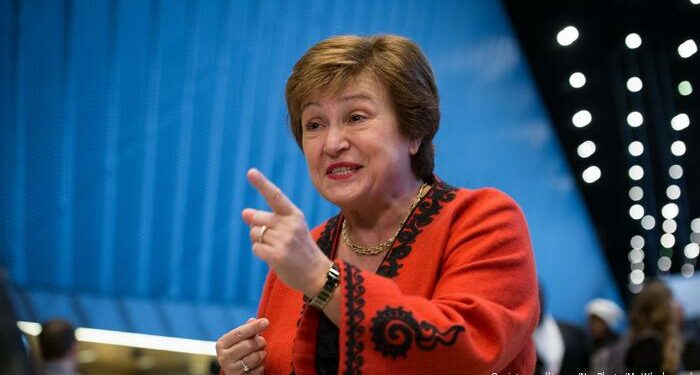IMF Sounds Alarm on Global Economic Uncertainty, Urges Reforms Amid Depleted Buffers
The International Monetary Fund (IMF) has delivered a stark warning about the fragility of the global economy, calling for urgent action to address deepening trade tensions, fiscal imbalances, and weak growth prospects. The call comes at a time when many countries, particularly emerging markets such as Ghana, which have lower buffers following years of economic shocks.
Speaking at the IMF’s flagship press briefing at the Spring Meetings in Washington, D.C., Managing Director Kristalina Georgieva outlined three overarching priorities in the institution’s Global Policy Agenda 2025: resolve trade tensions swiftly, safeguard macro-financial stability, and double down on productivity-boosting reforms.
“The world economy is facing a new and major test, and it faces it with policy buffers depleted by the shocks of recent years,” Georgieva warned.
The Fund has downgraded its global growth outlook in its latest World Economic Outlook, citing volatile markets, rising uncertainty, and tighter financial conditions, conditions that have intensified in the wake of recent tariff announcements by major economies. These developments, Georgieva said, threaten to stall investment and consumption, deepening already fragile growth in many regions.
Ghana’s Parallel Struggles with Fiscal Space and Growth
For Ghana, which recently reached a staff-level agreement under its IMF programme, the Fund’s messaging hits home. The country continues to navigate fiscal consolidation under tight constraints, with public debt levels elevated and growth tepid. Though the cedi has shown signs of appreciation in early 2025, the economy remains exposed to global shocks, particularly through trade disruptions and volatile capital flows.
Georgieva’s call for credible fiscal adjustment paths resonates with Ghana’s ongoing efforts to manage spending while preserving critical investment in social services and infrastructure. The IMF cautioned that these tradeoffs will be “toughest for low-income countries,” especially in an environment of reduced aid flows and tight global financial conditions.
“We cannot have countries with a tax-to-GDP ratio below 15 percent and still expect to sustain state functions,” Georgieva noted, reinforcing the Fund’s emphasis on domestic resource mobilization.
Ghana, whose tax-to-GDP ratio has historically hovered below the 15 percent threshold, has been under pressure to improve revenue collection, an effort further complicated by widespread tax resistance and structural informality.
The Case for Central Bank Independence and Exchange Rate Flexibility
With inflation risks still elevated in some regions, the Fund has underscored the importance of data-driven monetary policy. Ghana’s central bank, having recently cut policy rates to stimulate growth, must walk a tightrope between supporting recovery and maintaining price stability. The IMF’s prescription, clear communication, credible targets, and institutional independence, is especially pertinent given recent scrutiny of the Bank of Ghana’s balance sheet.
Georgieva also emphasised exchange rate flexibility as a critical shock absorber for emerging economies. This is particularly relevant for Ghana, where currency volatility has in the past triggered inflationary pressures and policy reversals. The IMF encouraged countries to rely on its Integrated Policy Framework when navigating disruptive currency dynamics.
Reforms for Resilience in a Low-Growth World
Perhaps the most enduring theme in Georgieva’s remarks was the urgent need for growth-oriented structural reforms. She cited labour market flexibility, innovation policy, and a pro-entrepreneurship business environment as foundational to medium-term recovery.
Ghana, where structural bottlenecks and a skills mismatch persist, is seeking to implement productivity-boosting measures under its Growth and Jobs Strategy, a multi-year initiative supported by the World Bank and other partners. Yet questions remain about the pace and depth of reform implementation, especially in light of political cycles and fiscal limitations.
Debt, Crisis Prevention, and Global Cooperation
Georgieva also highlighted the IMF’s role in supporting predictable and faster sovereign debt restructuring, welcoming this week’s endorsement of a “playbook” under the Global Sovereign Debt Roundtable. This development is likely to reassure Ghanaian authorities, who have been engaged in complex negotiations with external creditors following the domestic debt exchange in 2023–2024.
In parallel, the Fund reaffirmed its commitment to enhancing the Global Financial Safety Net, including through stronger collaboration with regional financial arrangements and central bank swap lines. For a country like Ghana, which remains vulnerable to external financing shocks, this infrastructure provides critical backstop confidence.
A Pivotal Moment
The IMF’s message was clear: the window for reform is narrow, but still open. In the words of Georgieva: “Now is the time for long-needed but often delayed reforms that can create a good business environment… and give countries a chance to catch the benefits of rapid technological advancements.”
Whether Ghana can seize this moment depends not only on its commitment to fiscal discipline and growth reforms but also on the degree of global cooperation that can shield vulnerable economies from further turbulence.








